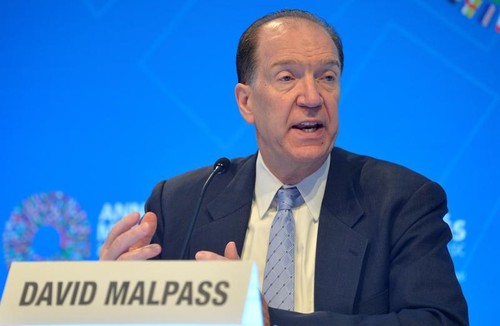The US Federal Reserve (FED) on Wednesday raised the interest rate 0.75% to try to rein in inflation, which has been sitting at a 40-year high since the beginning of the year. This was the third time in a row that the FED has bumped the interest rate 0.75% and the fifth rate hike this year.
Analysts fear the FED's move will increase the risk of a recession for the world's largest economy, because base rate hikes cause other interest rates to increase, for home loans, car loans, credit cards, and business loans.
Following the rate hike announcement, FED Chairman Jerome Powell said he doesn’t know if higher interest rates will cause a recession but acknowledged the consequences tightening could have on the economy.
The FED’s projections, alongside the rate hike announcement, suggest higher interest rates could push unemployment to 4.4% next year compared to the current unemployment rate of 3.7%. The projected GDP growth rate for this year has been adjusted to just 0.2%.
 World Bank President David Malpass. Photo: Reuters World Bank President David Malpass. Photo: Reuters
|
But it is not only the US economy that is in trouble. The World Bank warned last week that the world may be edging toward a global recession in 2023 and a string of financial crises in emerging markets and developing economies that would do them lasting harm.
In a report released just a few days ago, the Asian Development Bank (ADB) lowered its forecasts for economic growth in developing Asia and the Pacific to 4.3% this year compared to its projection in April of a 5.2% expansion. It forecast China's growth this year will decrease from 5% to 3.3% due to its anti-epidemic lockdowns and travel restrictions disrupting economic activities.
Developing Asia includes the 46 ADB members, stretching from the Cook Islands in the Pacific to Kazakhstan in Central Asia. The region's growth forecast last year was 7%.
Caution
Economists have called on governments to take prudent actions and adopt appropriate solutions to boost production for growth.
ADB Chief Economist Albert Park said “risks loom large” for the region. He called on governments in developing Asia to remain vigilant against these risks and take the necessary steps to contain inflation without derailing growth.
World Bank President David Malpass urged policymakers to shift their focus from reducing consumption to boosting production, saying that policies should seek to generate additional investment and improve productivity and capital allocation, which are critical for growth and poverty reduction.